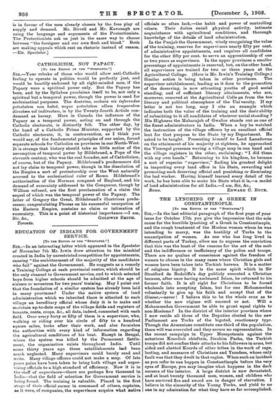CATHOLICISM, NOT PAPACY.
[TO THR EDTIOR Of THE "5PRCTATOR.]
SIR,—Your rebuke of those who would allow anti-Catholic feeling to operate in politics would be perfectly just, and would be heartily endorsed by all right-minded men, if the Papacy were a spiritual power only. But the Papacy has been, and by the Syllabus proclaims itself to be, not only a spiritual but a temporal power, though the power is used for ecclesiastical purposes. The doctrine, ecclesia vis inferendae potestatem non habet, neque potestatem ullam temporalem directam vel indirect am, is by the Twenty-fourth Article con- demned as heresy. Here in Canada the influence of the Papacy as a temporal power, acting on and through the Catholic electorate, is distinctly felt. The other day, by the hand of a Catholic Prime Minister, supported by the Catholic electorate, it, in contravention, as I think you would say, of the fundamental principles of our union, forced separate schools for Catholics on provinces in our North-West. It is strange that history should take so little notice of the assumption of temporal power by Hildebrand, a Pope of the eleventh century, who was the real founder, not of Catholicism, of course, but of the Papacy. Hildebrand's predecessors did not lay claim to temporal power, though in the dissolution of the Empire a sort of protectorship over the West naturally accrued to the ecclesiastical ruler of Rome. Hildebrand's authorisation of the Norman conquest of England, and his demand of suzerainty addressed to the Conqueror, though by William refused, are the first proclamation of a claim the sequel of which was the temporal power of the Papacy. The letter of Gregory the Great, Hildebrand's illustrious prede- cessor, congratulating Phocas on his successful usurpation of the Eastern Empire, contains no claim or intimation of suzerainty. This is a point of historical importance.—I am,






































































 Previous page
Previous page